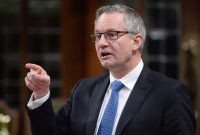Support strong Canadian climate journalism for 2025
Britain's envoy to Canada says his country will push hard for the speedy approval of the Canada-EU free-trade agreement despite the Brexit referendum decision to leave the 28-country bloc.
High Commissioner Howard Drake told The Canadian Press that Britain is bound by all European Union treaties until it formally negotiates and signs an agreement to leave — a process destined to take more than two years.
In the meantime, Drake said, Britain fully backs the current Canada-EU plan that would see the Comprehensive Economic and Trade Agreement be provisionally applied sometime early next year.
"There is quite an ambitious timetable for that to happen, and we will be in there making it happen," Drake said.
"That's the timetable that European members — of which we are one — have been discussing with Canada."
Drake's comments are in line with those of Canadian Trade Minister Chrystia Freeland, who has said she received broad assurances from across Europe that the deal can be signed this fall and provisionally applied next year, after the European Parliament ratifies it.
Provisional application means that, by some estimates, as much as 90 per cent of the deal would come into force without the ratification of the EU's 28 member parliaments because the vast majority of the pact would essentially fall under EU jurisdiction.
The waters were muddied recently when Britain's new trade minister, Liam Fox, reportedly told a British newspaper that "very fruitful" bilateral trade talks with Canada had begun.
Drake had nothing to say about the remarks attributed to Fox, but said his country had not started free-trade talks with Canada. "I can't comment on what's in the press. All I can tell you is what the government's position is."
Drake said Fox and Freeland had good discussions earlier this month when the Canadian minister was in London. But he said because Britain is still part of the EU, it can't sign any new trade deals of its own.
"We have had very, very good conversations with a number of our close friends around the world, some of whom we have very important trading relationships with. Canada is one of those," Drake said.
"That's as far as it goes."
Britain has always been a trading country, and that's not about to change, he said.
The first order of business for Britain will be to work out the details of its future trading arrangement with the EU, he said.
Britain has no actual trade negotiators of its own because it ceded that responsibility to the EU when it joined 43 years ago, so it will likely have to build a team that is expected to number in the hundreds.
Drake noted that Britain has not invoked Article 50 of the EU treaty, which would trigger the two-year clock towards negotiating Britain's exit from the bloc.
Some analysts have said it might take much longer than that to negotiate Britain's departure because it has become so deeply intertwined with the EU.
Drake dismissed any suggestion that Britain may eventually decide not leave, pointing to Prime Minister Theresa May's remark that "Brexit means Brexit" as a result of the June referendum result.
May has said that Britain won't begin its exit talks with the EU this year because the country first needs clear objectives.
"The detail of that is obviously a matter of negotiation between us and the EU," Drake said. "The prime minister has said that the UK approach and objectives for that discussion need to be worked out."



Comments